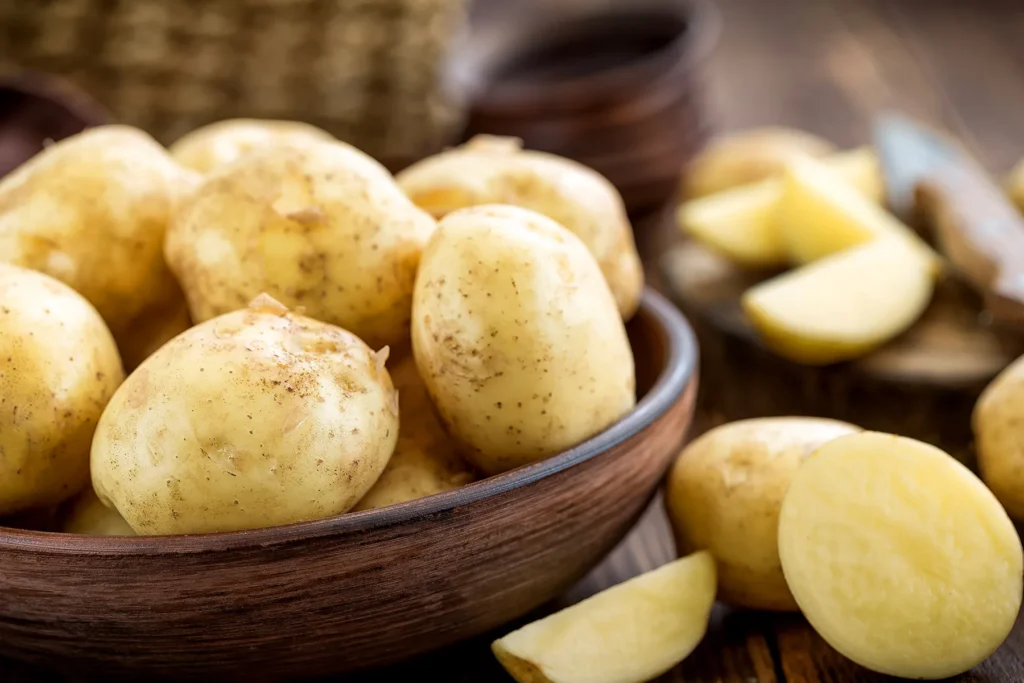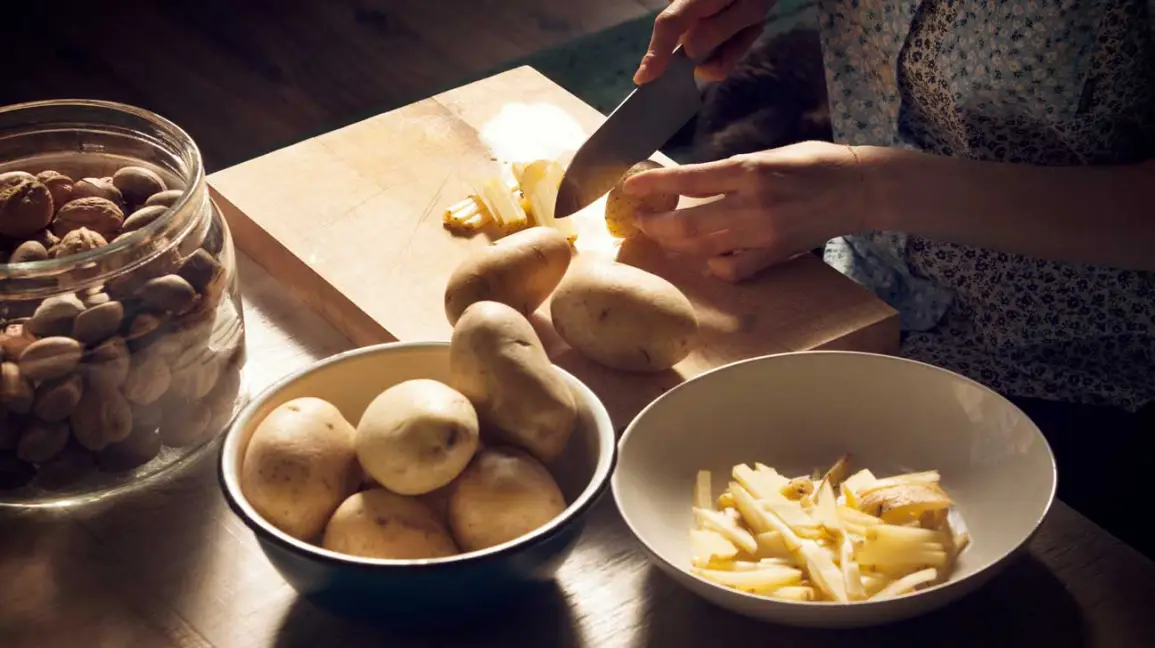Potatoes have long been a staple in homes around the world, yet they often get a bad rap when it comes to health. Especially russet potatoes—the large, brown-skinned variety many associate with baked potatoes or fries—are commonly misunderstood. While some avoid them due to carbs, science tells a different story. Russet potato nutrition reveals a wealth of health benefits, from supporting heart function to improving digestion. In this article, we’ll explore ten science-backed reasons why russet potatoes deserve a place on your plate.
What Makes Russet Potatoes Special
Russet potatoes are more than just comfort food. They are naturally fat-free, cholesterol-free, and low in sodium. A medium-sized russet potato contains about 168 calories, 37 grams of carbohydrates, 4.5 grams of protein, and nearly 5 grams of fiber if you eat the skin. But what really makes them stand out is their rich nutrient profile. They’re packed with potassium, vitamin C, vitamin B6, iron, magnesium, and small amounts of antioxidants. Their starch content may be high, but when prepared right, it offers health perks that go beyond energy.
High in Potassium
One of the standout benefits of russet potato nutrition is potassium. A single medium potato has more potassium than a banana—around 950 milligrams. This mineral plays a key role in controlling blood pressure, maintaining fluid balance, and keeping muscles and nerves working properly. If you’re looking for a natural way to support your heart, adding russet potatoes can help manage your sodium-to-potassium ratio, a crucial factor in cardiovascular health.
Rich Source of Vitamin C
Vitamin C isn’t just found in oranges. Russet potatoes are a surprising source of this immune-boosting antioxidant. Eating one with the skin provides nearly 20% of your daily vitamin C needs. This vitamin helps strengthen your immune response, aids collagen production for healthy skin, and supports wound healing. Since vitamin C breaks down with heat, steaming or lightly baking can preserve more of this valuable nutrient.
Natural Energy Booster
Feeling sluggish? Russet potatoes are a natural source of complex carbohydrates, your body’s preferred fuel source. Unlike refined carbs, the starches in potatoes digest slowly, offering sustained energy. They make a perfect pre- or post-workout meal, giving your muscles the glycogen they need to perform and recover. Russet potato nutrition supports athletic performance without the crash that comes from sugary foods.
Aids Digestion
Thanks to their fiber content and resistant starch, russet potatoes support healthy digestion. Resistant starch isn’t fully broken down in the small intestine and instead feeds beneficial gut bacteria in the colon. This helps reduce inflammation, improve nutrient absorption, and even supports bowel regularity. When cooked and then cooled—like in potato salad—russet potatoes form more resistant starch, further enhancing their digestive benefits.
Promotes Satiety
If you’re watching your weight or simply trying to eat more mindfully, russet potatoes can help you feel full without going overboard on calories. They have one of the highest satiety scores of any food, meaning they help you feel satisfied longer. That’s because they’re high in water and fiber, both of which add volume without extra calories. Compared to processed snacks, a baked potato is a smart choice that can curb cravings.
Gluten-Free by Nature
For those with celiac disease or gluten sensitivity, finding satisfying starches can be tough. Thankfully, russet potato nutrition offers a safe and delicious gluten-free option. You can enjoy them roasted, mashed, or baked without worrying about digestive issues or cross-contamination. They’re also a great flour substitute in recipes when mashed and used creatively.
Good for Brain Health
Vitamin B6 often flies under the radar, but it’s essential for brain health. Russet potatoes contain nearly 20% of your daily B6 in just one serving. This vitamin is crucial for neurotransmitter function, helping regulate mood, focus, and sleep. It also plays a role in making serotonin and dopamine—chemicals linked to happiness and mental clarity. Eating foods rich in B6 can help maintain cognitive balance naturally.

Helps Maintain Blood Sugar Levels
Many assume russet potatoes spike blood sugar, but that’s only part of the story. The way you prepare them matters. When cooked and cooled, the starches in russet potatoes change form, increasing resistant starch. This type of starch slows digestion and moderates glucose release, leading to a more stable blood sugar response. For those managing prediabetes or insulin sensitivity, preparation is key. Enjoying them with fiber-rich veggies or lean proteins can also blunt blood sugar spikes.
Supports Iron Absorption
Another lesser-known benefit of russet potato nutrition is its role in iron metabolism. Potatoes provide both iron and vitamin C, which work together to enhance absorption—especially for non-heme (plant-based) iron. This is vital for preventing fatigue, boosting red blood cell production, and supporting overall vitality. It’s a smart move for vegetarians and anyone who struggles with low iron levels.
Skin-On Benefits
It’s tempting to peel your potatoes, but eating them with the skin can significantly boost their nutritional value. The skin is where much of the fiber, potassium, and antioxidants reside. Flavonoids found in potato skins act as natural anti-inflammatory compounds and help reduce oxidative stress in the body. If you want the full benefit of russet potato nutrition, consider scrubbing them clean and leaving the skin on.
Tips to Maximize Nutrition
To get the most out of your potatoes, how you prepare them matters. Baking, steaming, or air-frying preserves more nutrients compared to deep frying. Avoid loading them with heavy creams, butter, or processed cheese, which can cancel out their benefits. Instead, pair them with healthy fats like olive oil, protein like grilled chicken, or fresh herbs to elevate both taste and health. For added gut perks, try cooking and chilling your potatoes to enhance resistant starch formation.
Common Myths About Potatoes
One of the biggest misconceptions is that russet potatoes are unhealthy or fattening. This comes from their association with fried fast food and butter-laden mashed potatoes. But it’s not the potato—it’s the preparation. When cooked healthfully, russet potato nutrition actually supports weight control, energy, and immunity. Another myth is that sweet potatoes are far superior. While sweet potatoes have more vitamin A, russet potatoes offer more potassium and comparable fiber, making both worthy choices.
What’s Inside a Russet Potato?
What nutrients do russet potatoes contain?
Russet potatoes are rich in complex carbohydrates, dietary fiber, and essential vitamins like Vitamin C and B6. They’re also a good source of potassium, magnesium, and iron. Most of these nutrients are found just beneath the skin, so eating them unpeeled is often a smarter choice.
Do russet potatoes have fiber?
Yes! A medium-sized russet potato (with skin) contains about 2 grams of dietary fiber. This helps with digestion, satiety, and maintaining steady blood sugar levels.
Are russet potatoes a healthy source of carbs?
Absolutely. Russet potatoes provide complex carbs, which are digested slowly, keeping you fuller for longer and giving a steady supply of energy—unlike refined carbs or sugars.
What about vitamins and minerals?
They are loaded with:
- Vitamin C – supports the immune system
- Vitamin B6 – helps brain development and nervous system
- Potassium – helps control blood pressure
- Magnesium – supports muscle and nerve function
Russet Potatoes & Weight Management
Do russet potatoes cause weight gain?
Not by themselves. Weight gain comes from overeating calories—not from potatoes. Russets are actually quite low in calories (around 160 per medium potato) if you avoid frying or heavy toppings like cheese and sour cream.
Are russet potatoes good for weight loss?
Yes, especially when baked or boiled with the skin on. They’re filling and low in fat, which makes them a great addition to a calorie-conscious diet when eaten in moderation.
Can you eat them after a workout?
Definitely. Their high carb content makes them ideal for post-workout recovery by replenishing glycogen stores. Pairing them with a lean protein can make for a great recovery meal.
Do they fit into low-carb or keto diets?
No, not really. Russet potatoes are high in carbohydrates and aren’t suitable for strict low-carb or ketogenic diets. But they work well in a balanced diet for most people.
Health Conditions & Dietary Considerations
Can people with diabetes eat russet potatoes?
In moderation, yes. Russets have a high glycemic index, so portion control is key. It’s best to pair them with fiber, protein, or healthy fats to slow down sugar absorption.
Are russet potatoes safe for people with high blood pressure?
Yes! Thanks to their high potassium content, they may actually help lower blood pressure. Just avoid adding too much salt or butter.
Do they affect cholesterol?
Russet potatoes are naturally cholesterol-free and low in fat. If prepared healthily (baked or steamed), they can be a heart-friendly food.
Cooking & Eating Tips
What’s the healthiest way to cook russet potatoes?
Baking, boiling, or steaming them with the skin on is the healthiest option. Avoid deep frying, which adds unnecessary fats and calories.
Is frying russet potatoes bad for health?
It can be. Deep-fried potatoes (like French fries) absorb a lot of unhealthy oils and contribute to weight gain, high cholesterol, and other health issues.
Should you eat the skin?
Yes! The skin contains most of the fiber, iron, and potassium. Just be sure to wash them properly before cooking.
Comparing with Other Potatoes
How do russet potatoes compare to sweet potatoes nutritionally?
Sweet potatoes have more beta-carotene (Vitamin A), but russet potatoes are higher in potassium and slightly more protein-rich. Both have their own nutritional advantages.
Are russet potatoes better than white potatoes?
They’re quite similar, but russets are usually larger and have slightly more fiber and potassium than white potatoes. The better choice depends on your nutritional goals.
Diet Compatibility
Are russet potatoes vegan and vegetarian-friendly?
Yes! They’re completely plant-based and fit perfectly in both vegan and vegetarian diets.
Are russet potatoes gluten-free?
100%. Potatoes are naturally gluten-free, making them safe for people with celiac disease or gluten sensitivity.
Can russet potatoes be part of a complete meal?
They sure can. Add some grilled chicken or tofu and a mix of veggies, and you’ve got a well-rounded, nutritious plate.
For Families and Special Groups
Are russet potatoes good for kids?
Definitely. Kids benefit from the energy, vitamins, and minerals in russet potatoes—especially when they’re cooked without excess oils or cheese.
Can pregnant women eat russet potatoes?
Yes, they’re a safe and healthy option during pregnancy. They provide folate, iron, and energy, all important for expecting mothers. Just be cautious with how they’re prepared.
Conclusion
Russet potatoes have been wrongly cast as a guilty pleasure, but the science tells another story. They’re nutrient-dense, versatile, and surprisingly good for your health. From boosting immunity to aiding digestion, their benefits extend far beyond comfort food. Understanding russet potato nutrition helps you make smarter food choices without cutting out the classics. When prepared right, they can be a regular part of a balanced, health-conscious lifestyle. So next time you’re at the grocery store, don’t pass up the humble russet—it might just be one of the most underestimated superfoods in your kitchen.
FAQs
Q1: Can russet potatoes be part of a weight-loss diet?
Yes, when baked or steamed and eaten with the skin, they offer fiber and satiety without excess calories.
Q2: Are russet potatoes safe for people with diabetes?
Yes, if portioned properly and preferably cooled after cooking to increase resistant starch, they can fit into a balanced diabetic diet.
Q3: Is it better to eat russet potatoes with or without the skin?
With the skin. That’s where much of the fiber, potassium, and antioxidants are found.
Q4: How do russet potatoes compare to sweet potatoes nutritionally?
Sweet potatoes offer more vitamin A, but russets provide more potassium and similar fiber content.
Q5: What is the healthiest way to cook russet potatoes?
Baking or steaming without added fats is the best way to retain nutrients and avoid excess calories.
